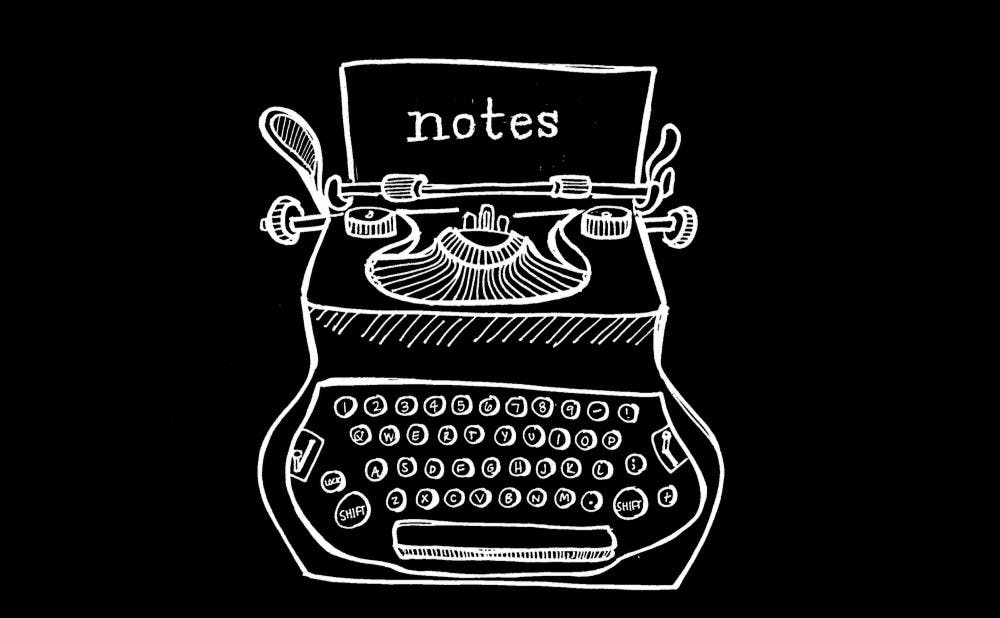Look at any of the bylines in the print edition of Recess, and you’ll notice we’re the only section of The Chronicle that uses this term for our staff: “writer.”
I’ve always found this title — where “reporter” or “correspondent” or “contributor” or some variation might have otherwise been — to be especially fitting for what we do at Recess. On one level, the designation is a necessity in a section that, more than any other, deals equally in news and opinion. It’d be a little odd, for example, to give the title of “reporter” to someone who may write a feature on a visiting artist one week and a definitive ranking of campus playlists the next. But on a greater level, the title emphasizes the role of Recess not only as a source of content but as a workshop, a place where students can become, yes, writers. In its very format, the section encourages, even necessitates, an exploration of voice and style.
Like so many other would-be Chronicle writers, it was this quality that attracted me to Recess in my first semester at Duke. At one of the first interest meetings, I’d responded that I was interested in news, sports, opinion and culture — effectively circling “all of the above” on the mailing list sign-up — and, accordingly, I attended a few different sections before settling on one. I quickly realized, though, that I had no interest in covering any sport other than basketball; I didn’t have enough opinions to fill an 800-word column once a week; and I wasn’t captivated by the talk of nut graphs and ledes that greeted me in the first news meetings. Recess presented itself to me as the one place where (almost) anything would go: In my first month of writing, I previewed a live film score on campus, reviewed an album and penned a (well-researched and, I’d add, justified) takedown of the Marketplace playlist. For the first time in my life, I was given the incentive to write regularly about things that interested me, to grow as a writer and to make mistakes.
That last part of the equation — the mistakes — has taken on a new dimension for me in my past year as editor, because I’ve made, well, so many. As a writer, those mistakes were more personal, stemming from the process of learning how to engage with sources, how to retain my subjectivity without compromising accuracy, how to accept criticism. As an editor, though, there’s an entire section (at the risk of seeming fatalistic) riding on them. Our second issue of the school year, and one of our biggest at that, saw a misprint that, in hindsight, is easy to laugh at: It took two rounds of editing and three pairs of eyes for us to realize that we’d run “venereal” in the place of “visceral.” Elsewhere, there have been the inevitable, unpredictable glitches on online publication, the pitches missed and the corrections issued.
Granted, the mistakes have come fewer and farther between as the year has gone on. And if this seems like a grim review of a tenure, it’s not — on the contrary, to even have the opportunity to develop those writing and editing skills, and all the mistakes that entails, is a privilege. As my term as editor has drawn to a close and my search for real-life work has begun in earnest, I’ve become more and more aware of this fact. Rarely, if ever again, will we have the nearly unlimited resources to write and to learn offered in a place like Recess — especially with no prior journalism experience, as was the case for me and for most writers here. Beyond Duke, the chances to be published are slimmer, the price for mistakes dearer.
The Chronicle, in the end, is a student publication. And this is a fact that doesn’t have to be mutually exclusive with good reporting. Rather, we should recognize it as an opportunity to encourage learning, exploration, even mistakes, as there is no better time to do so than now. If journalists have one vice, it’s self-importance, and we should never assume that our work, while important, reaches some ideal of objective truth. We are in the business of telling stories — whether that’s an administrative scandal, a new exhibit at the Nasher or a retrospective review — and we should urge our writers to find the joy in doing just that and, while we’re at it, resist taking ourselves so seriously.
I hope Recess will continue, long after I’m finished at Duke, to be a haven for the students seeking an outlet to write creatively and the content that doesn’t seem to fit anywhere else. For now, I’m confident that the section will be in good hands for the foreseeable future.
And I’ve realized that, as much as I’ve loved being editor, I’ve kind of missed being a writer.
Will Atkinson is a Trinity sophomore and the outgoing Recess editor. He’d like to thank Likhitha for gambling on him a year ago, the Recess staff writers for their unwavering dedication to the section, all of the Class of 2017 seniors and juniors abroad whose fortuitous absence made being editor possible and, of course, Nina, his managing editor, podcast co-host, in-house graphic designer and friend, for all those Tuesday evenings spent in 301 Flowers. His one regret is that he’ll have to change his Twitter bio back to normal, but he’ll still be around Recess next year, joining Dillon Fernando in the ranks of former editors demoted to the culture section.
Get The Chronicle straight to your inbox
Signup for our weekly newsletter. Cancel at any time.

